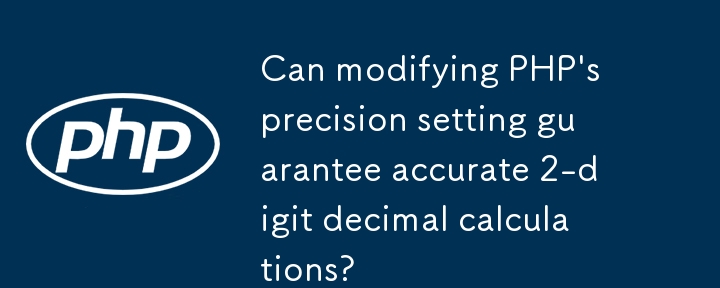

Floating-point computations can lead to discrepancies due to the limitations of binary representation. While one potential remedy is to alter the precision setting in php.ini, it's crucial to assess its reliability.
No, modifying the precision setting alone cannot guarantee precise 2-digit calculations, particularly when dealing with quantities greater than 10^6.
To demonstrate the shortcomings of this approach, consider the following example:
$a = 5.88; $q = 2.49; $b = $a * 0.01; echo ($a * $q) - $b;
Output:
14.5824
Even with a precision of 8, the result is not a precise 2-digit value due to intermediate calculations.
Instead of relying on precision workarounds, consider alternative solutions:
Question 1: Failure Range with Precision = 8
It's impractical to test for all combinations of numbers between 0 and 999999.99. However, a simple test demonstrates that even with a precision of 8, inaccuracies can occur:
$a = 0.19;
$b = 0.16;
$i = 0;
for ($c = 0.01; $c <= 0.07; $c += 0.01) {
$i = $i + $c;
}
echo $i - ($a + $b);Output:
0.000055879354492188
This error is due to the accumulation of rounding errors during the addition of floating-point numbers.
Question 2: Mathematical Estimation of Failure Threshold
Estimating the failure threshold requires complex mathematical analysis. A comprehensive discussion on the topic is beyond the scope of this article.
However, it's important to remember that floating-point calculations have inherent accuracy limitations due to the binary representation of numbers. Therefore, relying on precision workarounds alone is not a foolproof solution.
The above is the detailed content of Can modifying PHP's precision setting guarantee accurate 2-digit decimal calculations?. For more information, please follow other related articles on the PHP Chinese website!
 How to calculate the refund handling fee for Railway 12306
How to calculate the refund handling fee for Railway 12306
 Digital camera driver
Digital camera driver
 what is mysql index
what is mysql index
 What to do if css cannot be loaded
What to do if css cannot be loaded
 Main contents of database conceptual design
Main contents of database conceptual design
 What is the difference between full-width spaces and half-width spaces?
What is the difference between full-width spaces and half-width spaces?
 How to register a business email
How to register a business email
 What are the jobs in Linux?
What are the jobs in Linux?




